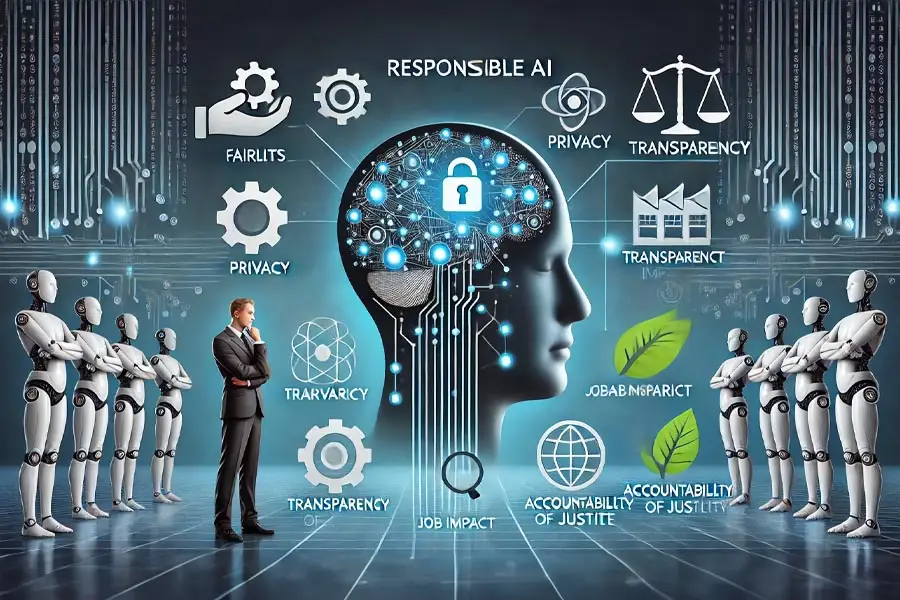The ethical issues surrounding the creation, application, and effects of artificial intelligence (AI) are more crucial than ever as it permeates more aspects of our lives. Ethical AI is essential to guaranteeing that this technology helps society in a responsible and equitable manner, covering everything from algorithm fairness to privacy, transparency, and responsibility. Here, we will examine the most important ethical issues surrounding AI and discuss why resolving them is crucial to a just, secure, and inclusive future.
1. Bias and Fairness in AI
Bias is one of the main ethical issues with AI. Biases in the data that AI systems are trained on are frequently reflected in them, which might produce unfair results. Facial recognition systems, for example, have demonstrated differences in accuracy between racial and gender groupings, which could result in misidentifications. Developers must make sure datasets are fair and diverse, containing feedback from a wide range of demographics, in order to counteract this. Organizations and governments are promoting “bias testing” to enhance results for all users because fairness in AI also necessitates frequent audits and transparency about the data and methodology employed.
2. Privacy and Data Security
AI is very data-dependent and frequently needs personal data to generate precise forecasts or tailored suggestions. There are serious privacy issues with this reliance. Private information regarding a person’s finances, health, and behavior may be misused, compromised, or accessed by unauthorized parties. Data reduction is emphasized by ethical AI methods, which make sure that just the information that is required is gathered and utilized. To secure users’ personal information, developers and businesses must proactively incorporate data security measures, encryption, and explicit privacy policies, even when privacy rules such as the CCPA and GDPR offer suggestions.
3. Transparency and Explainability
Machine learning-based AI models, in particular, can be intricate and difficult to understand. This lack of transparency, sometimes referred to as the “black box” problem, makes it challenging to comprehend how AI makes certain decisions. Transparency is a top priority for ethical AI, which promotes interpretable and intelligent systems. Explainability becomes essential, particularly in industries where AI-driven decisions might have a big impact, like healthcare and finance. AI systems ought to be built with human-readable justifications for their choices so that regulators and users may assess how accurate and fair they are.
4. Accountability and Responsibility
It can be difficult to assign blame when AI systems malfunction or cause harm. For instance, it is not often obvious who is responsible for accidents involving autonomous cars—the software developer, the car manufacturer, or even the user. Clear accountability standards are required by ethical AI frameworks, wherein developers and businesses bear responsibility for the outcomes of their AI systems. Establishing accountability helps firms create more dependable processes that are simpler to fix when problems occur.
5. Job Displacement and Economic Impact
Automation and artificial intelligence (AI) are predicted to transform the nature of employment and even eliminate jobs across a range of industries. Ethical questions concerning economic inequality and the nature of employment in the future are brought up by this change. Even if AI has the potential to generate new employment opportunities, regulations and initiatives for people who might suffer from job displacement must be developed. To assist employees in adjusting to new roles, ethical AI promotes funding for reskilling and upgrading programs. Governments and businesses must cooperate to guarantee that AI-driven economic transformations serve society fairly.
6. Autonomy and Control
The issue of human control becomes increasingly important as AI systems grow more independent, particularly in sectors like healthcare, defense, and transportation. To make sure that these systems adhere to moral principles and human values, ethical AI methods place a strong emphasis on human monitoring. To ensure that autonomous weapons are managed and utilized properly, for example, ethical issues necessitate stringent norms and restrictions. To avoid unforeseen effects and make sure AI is in line with social ideals, autonomy and human control must be balanced.
7. Environmental Impact
Significant processing power is needed for AI development and implementation, which may have an adverse effect on the environment and energy consumption. For example, throughout the course of their lifespan, training large AI models can have a carbon footprint equivalent to many cars. Sustainable methods in AI development are required by ethical AI, and these include employing green energy sources, optimizing algorithms for efficiency, and taking data centers’ environmental effects into account. It is critical to make sure AI development is in line with environmental sustainability objectives as it develops further.
8. Human Rights and Inclusivity
Instead of undermining inclusivity and human rights, AI could strengthen them. But occasionally, AI applications have been used in ways that jeopardize liberties, including surveillance systems that might violate people’s right to privacy and freedom of speech. Human-centered strategies that uphold individual liberties and encourage diversity are supported by ethical AI. We can guarantee that this technology upholds rather than jeopardizes fundamental human rights by creating AI systems that are equitable and accessible.
Conclusion
The ethical implications of AI go well beyond its technical advancements; they include human rights, environmental sustainability, accountability, privacy, and fairness. Addressing these ethical issues is essential to fostering diversity, fostering trust, and guaranteeing AI functions as a positive force in society as it continues to impact many facets of daily life. By working together, developers, legislators, and users may steer AI’s development in a way that upholds moral standards and is advantageous to everybody.

